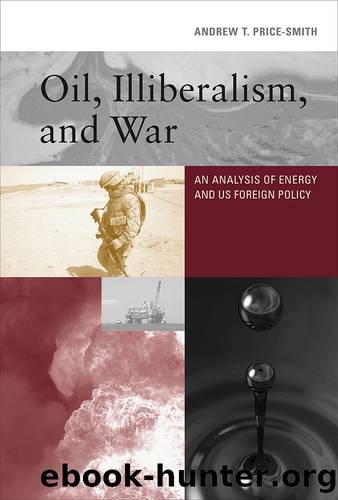Oil, Illiberalism, and War by Andrew T. Price-Smith

Author:Andrew T. Price-Smith [Price-Smith, Andrew]
Language: eng
Format: epub
Tags: [KEYWORDS, COMMA SEPARATED]
Publisher: The MIT Press
Published: 2015-07-14T16:00:00+00:00
Figure 4.2
source: http://www.judicialwatch.org/oldsite/IraqOilFrgnSuitors.pdf
Figure 4.3
source: http://www.judicialwatch.org/oldsite/IraqOilGasProj.pdf
Furthermore, former Secretary of the Treasury Paul O’Neill specifically confirmed that control over Iraqi oil was a significant objective of the administration in its drive to war, and that preparations to invade Iraq were well underway in 2001.54 Additionally, from February 2002 to March 2003 members of the Working Group of the Department of State’s Future of Iraq Project argued in meetings that Iraq “should be opened to international oil companies as quickly as possible after the war.”55 In January of 2003, executives from the oil industry were already meeting with US government officials to divvy up the spoils from a “possible war.” Specifically, these executives met with officials from the White House, the Department of State, and the Department of Defense.56 Moreover, Ibrahim Bahr al-Uloum, who had been a member of the Department of State working group, was appointed Iraq’s oil minister in the weeks after the invasion.57
After the invasion, one of the first things US forces did was protect the Iraqi oil ministry and Iraqi oil installations and infrastructure. Yetiv argues that the US military carried this out at the start of the war by “seizing oil-export facilities north of Kuwait, two major Iraqi oil terminals, Iraq’s southernmost oil fields of Basra, and the Oil Ministry in Baghdad.”58 Despite the protestations of Rumsfeld (and others in the Bush administration) that the war had nothing to do with oil, the president ultimately tipped his hand to Peter Baker of the Washington Post in late 2006, admitting “the war is about oil.” Trying to justify the continued US occupation of Iraq, Bush said “You can imagine a world in which these extremists and radicals got control of energy resources.”59
“It is politically inconvenient,” Alan Greenspan wrote in his book The Age of Turbulence, “to acknowledge what everyone knows: The Iraq War is largely about oil.”60 Equally damning were comments made in 2007 by General John Abizaid, the former head of US Central Command and Military operations in Iraq: “Of course it’s about oil; we can’t really deny that.” “People say we’re not fighting for oil,” Senator Chuck Hagel wrote in 2007. “Of course we are.”61
The invasion of Iraq began on March 19, 2003. The casualties included 4,480 deceased US soldiers, 3,400 deceased US contractors, and 31,928 US soldiers wounded in action. Brian Jenkins of the RAND Corporation estimates that between 110,000 and 150,000 Iraqis were killed during the war.62 In the end, the economic costs of the war were prodigious. Linda Bilmes and Joseph Stiglitz estimated that the costs of the war to the republic would exceed $3 trillion.63 Adjusted for inflation, it would be second only to World War II in terms of total US expenditures.
No weapons of mass destruction were ever found, nor was there ever any concrete evidence that the regime of Saddam Hussein was working with al-Qaeda. In hindsight this isn’t terribly surprising, as it would be highly unusual for a Baathist Arab regime to be in collusion with a network of Wahhabist Islamic fundamentalists.
Download
This site does not store any files on its server. We only index and link to content provided by other sites. Please contact the content providers to delete copyright contents if any and email us, we'll remove relevant links or contents immediately.
The Secret History by Donna Tartt(16625)
The Social Justice Warrior Handbook by Lisa De Pasquale(11489)
Thirteen Reasons Why by Jay Asher(7788)
This Is How You Lose Her by Junot Diaz(5774)
Weapons of Math Destruction by Cathy O'Neil(5037)
Zero to One by Peter Thiel(4824)
The Myth of the Strong Leader by Archie Brown(4789)
Promise Me, Dad by Joe Biden(4448)
Beartown by Fredrik Backman(4419)
Stone's Rules by Roger Stone(4416)
How Democracies Die by Steven Levitsky & Daniel Ziblatt(4399)
The Fire Next Time by James Baldwin(4343)
100 Deadly Skills by Clint Emerson(4079)
A Higher Loyalty: Truth, Lies, and Leadership by James Comey(4033)
Rise and Kill First by Ronen Bergman(4012)
The David Icke Guide to the Global Conspiracy (and how to end it) by David Icke(3883)
The Farm by Tom Rob Smith(3872)
Secrecy World by Jake Bernstein(3783)
The Doomsday Machine by Daniel Ellsberg(3731)
